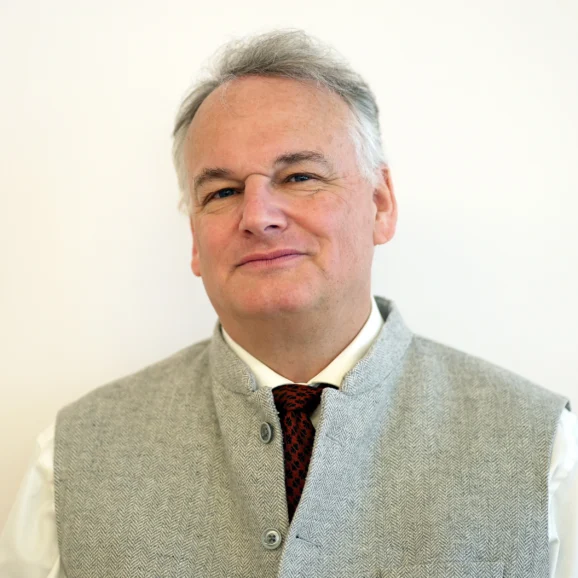Science, money, and the race for profit – but to what end?

John E. Kaye
- Published
- Science

Scientific advancements have transformed society, driving progress in health, technology, and equality. But as profit increasingly overshadows intellectual curiosity and collaboration, the future of meaningful innovation hangs in the balance, warns Dr Andreas Kluge
Throughout history, scientific advancements have driven societal progress. Innovations like aviation, telephony, and the rise in life expectancy have reshaped our world, especially in the West, where life expectancy has increased by over five years since 1990. These changes stem not just from intellectual curiosity, but from creativity, necessity, and economic motivations.
Technological superiority has often decided the fate of entire civilisations. The Phoenicians’ advanced shipbuilding, the Roman slingshot squadrons, and the Mongol archers enabled them to dominate their era. But were these breakthroughs the product of a grand vision, or simply the result of circumstances allowing such innovations to emerge? I’d argue the latter, especially when considering how innovation developed through different historical periods.
In medieval Europe, under the feudal system, innovation was virtually non-existent. With land and resources controlled by aristocrats, there was little incentive for technological progress. The “dark ages” were a time of stagnation. It wasn’t until the rise of capitalism in the 15th century, first in Renaissance Italy and later across Europe, that significant scientific and technological breakthroughs emerged. Suddenly, private ownership of capital goods and the drive for personal profit became the catalysts for change, opening the floodgates to innovation.
The link between money and scientific advancement has always been clear. Societies where financial support for research was most readily available saw the greatest discoveries. Consider the rise of banking in Italy, the invention of the printing press in Germany, or England’s industrial revolution powered by the steam engine. These innovations weren’t just about solving problems—they were about turning scientific discoveries into profitable ventures.
Before capitalism truly took hold, many scientists pursued knowledge without financial reward. However, with the economic changes brought by capitalism, incentives shifted. Great inventors like Leonardo da Vinci had wealthy patrons, turning intellectual curiosity into projects with economic value. Science and technology became tied to financial gain, and this relationship grew as the world became more commercially driven.

In the 19th century, Wilhelm von Humboldt championed “pure science,” advocating for scientific inquiry focused solely on the pursuit of knowledge, free from political or economic influence. His educational reforms in Prussia established the principles of academic freedom and the unity of teaching and research, shaping modern universities. Humboldt envisioned an education system that valued truth over profit. Sadly, as we look at today’s higher education landscape, his ideals seem increasingly out of reach.
Since the 1980s, shareholder-driven capitalism has further shifted the focus of universities and scientific research. In a world where financial profit reigns supreme, the ideal of “pure science” has increasingly taken a backseat. Universities have transformed into business-like institutions, prioritising efficiency and employability over intellectual growth. Education is streamlined to produce graduates with marketable skills, rather than nurturing well-rounded intellectuals as Humboldt envisioned.
The Bologna process, initiated in 1999, aimed to harmonise higher education across Europe, increasing global competitiveness. While it promoted student mobility and academic collaboration, it also turned universities into factories for market-ready graduates and research outcomes. The emphasis shifted towards measurable results that translate into financial gain, sidelining the humanities in favour of commercially viable STEM subjects. Universities are now more focused on rankings based on outputs like publications and third-party funding, rather than fostering intellectual exploration.
This market-driven shift has deeply impacted academic culture. Today’s students are often trained to specialise in narrow fields, rather than becoming versatile thinkers capable of engaging in interdisciplinary discussions or considering the broader implications of their work. This fragmentation has made intellectual dialogue across disciplines increasingly difficult if not impossible.
We see the consequences of this in the rise of science scepticism, particularly during the COVID-19 pandemic. Public distrust in scientific expertise reflects the failure of our educational system to foster critical thinking and open debate. Are we losing the general intellectual ability to engage in meaningful conversations about the world and society, or to question the impact of research across different specialist communities?

I believe this is partly a result of an educational system that prioritises financial success over intellectual curiosity.
The drive for profit has transformed scientific research. Venture capital funding for start-ups has brought scientists face to face with financial professionals focused on short-term returns rather than long-term, sustainable innovation. This creates a disconnect between the scientist’s original vision and the goals of their investors. Often, venture capitalists push for terms that aren’t in the best interest of the founders—such as low valuations, privileged shares, or influence over management decisions. These terms, while often deemed “customary,” are really designed to secure a financial exit for investors, rather than support the long-term success of the company or its products.
The situation is worsened by the fact that many European scientists are forced to look abroad for funding, as local sources often fall short. While this might seem like the only option, we have the financial power within Europe to support long-term, sustainable innovation. The solution lies in recalibrating our approach to investment—moving away from the “quick profit” mentality towards a more collaborative, long-term strategy that benefits both scientists and society.
Money should be a means to an end, not the end itself. Instead of using financial power to control and exploit innovation, we should focus on using it to enable progress for the greater good. Science is most powerful when it serves humanity, not just the bottom line. If we can return to a model of collaboration, where investors and scientists work together for the long-term benefit of society, we will unlock the full potential of scientific discovery and create a better world for all.
Additional reporting by Lenny Greta

Dr. Andreas Kluge has over 20 years of experience in pharmaceutical research and development. He is the Founder, General Manager, and first Medical Director of ABX-CRO, a global full-service contract research organisation (CRO) headquartered in Dresden, Germany, providing preclinical and clinical development of biologics, radiopharmaceuticals, and anticancer therapies. He also founded ABX GmbH (www.abx.de), a global leader in radiopharmaceutical precursor manufacturing, Therapeia, an oncological development company, which was later acquired by Telix, as well as PharmAI GmbH, an in silico Drug Discovery firm. With a background in nuclear medicine, radiochemistry, and molecular imaging, Dr. Kluge has played a key role in developing radionuclide-based products and devices. He is the author of numerous patents and publications in Nuclear Medicine, neurology, infection, and immunology. A registered physician, he holds a doctorate in Medicine from the Free University of Berlin.
Images © Wolfgang Pellicci
RECENT ARTICLES
-
 WPSL targets £16m-plus in global sponsorship drive with five-year SGI partnership
WPSL targets £16m-plus in global sponsorship drive with five-year SGI partnership -
 Dubai office values reportedly double to AED 13.1bn amid supply shortfall
Dubai office values reportedly double to AED 13.1bn amid supply shortfall -
 €60m Lisbon golf-resort scheme tests depth of Portugal’s upper-tier housing demand
€60m Lisbon golf-resort scheme tests depth of Portugal’s upper-tier housing demand -
 2026 Winter Olympics close in Verona as Norway dominates medal table
2026 Winter Olympics close in Verona as Norway dominates medal table -
 Europe’s leading defence powers launch joint drone and autonomous systems programme
Europe’s leading defence powers launch joint drone and autonomous systems programme -
 Euro-zone business activity accelerates as manufacturing returns to expansion
Euro-zone business activity accelerates as manufacturing returns to expansion -
 Deepfake celebrity ads drive new wave of investment scams
Deepfake celebrity ads drive new wave of investment scams -
 WATCH: Red Bull pilot lands plane on moving freight train in aviation first
WATCH: Red Bull pilot lands plane on moving freight train in aviation first -
 Europe eyes Australia-style social media crackdown for children
Europe eyes Australia-style social media crackdown for children -
 These European hotels have just been named Five-Star in Forbes Travel Guide’s 2026 awards
These European hotels have just been named Five-Star in Forbes Travel Guide’s 2026 awards -
 McDonald’s Valentine’s ‘McNugget Caviar’ giveaway sells out within minutes
McDonald’s Valentine’s ‘McNugget Caviar’ giveaway sells out within minutes -
 Europe opens NanoIC pilot line to design the computer chips of the 2030s
Europe opens NanoIC pilot line to design the computer chips of the 2030s -
 Zanzibar’s tourism boom ‘exposes new investment opportunities beyond hotels’
Zanzibar’s tourism boom ‘exposes new investment opportunities beyond hotels’ -
 Gen Z set to make up 34% of global workforce by 2034, new report says
Gen Z set to make up 34% of global workforce by 2034, new report says -
 The ideas and discoveries reshaping our future: Science Matters Volume 3, out now
The ideas and discoveries reshaping our future: Science Matters Volume 3, out now -
 Lasers finally unlock mystery of Charles Darwin’s specimen jars
Lasers finally unlock mystery of Charles Darwin’s specimen jars -
 Strong ESG records help firms take R&D global, study finds
Strong ESG records help firms take R&D global, study finds -
 European Commission issues new cancer prevention guidance as EU records 2.7m cases in a year
European Commission issues new cancer prevention guidance as EU records 2.7m cases in a year -
 Artemis II set to carry astronauts around the Moon for first time in 50 years
Artemis II set to carry astronauts around the Moon for first time in 50 years -
 Meet the AI-powered robot that can sort, load and run your laundry on its own
Meet the AI-powered robot that can sort, load and run your laundry on its own -
 Wingsuit skydivers blast through world’s tallest hotel at 124mph in Dubai stunt
Wingsuit skydivers blast through world’s tallest hotel at 124mph in Dubai stunt -
 Centrum Air to launch first European route with Tashkent–Frankfurt flights
Centrum Air to launch first European route with Tashkent–Frankfurt flights -
 UK organisations still falling short on GDPR compliance, benchmark report finds
UK organisations still falling short on GDPR compliance, benchmark report finds -
 Stanley Johnson appears on Ugandan national television during visit highlighting wildlife and conservation ties
Stanley Johnson appears on Ugandan national television during visit highlighting wildlife and conservation ties -
 Anniversary marks first civilian voyage to Antarctica 60 years ago
Anniversary marks first civilian voyage to Antarctica 60 years ago



























